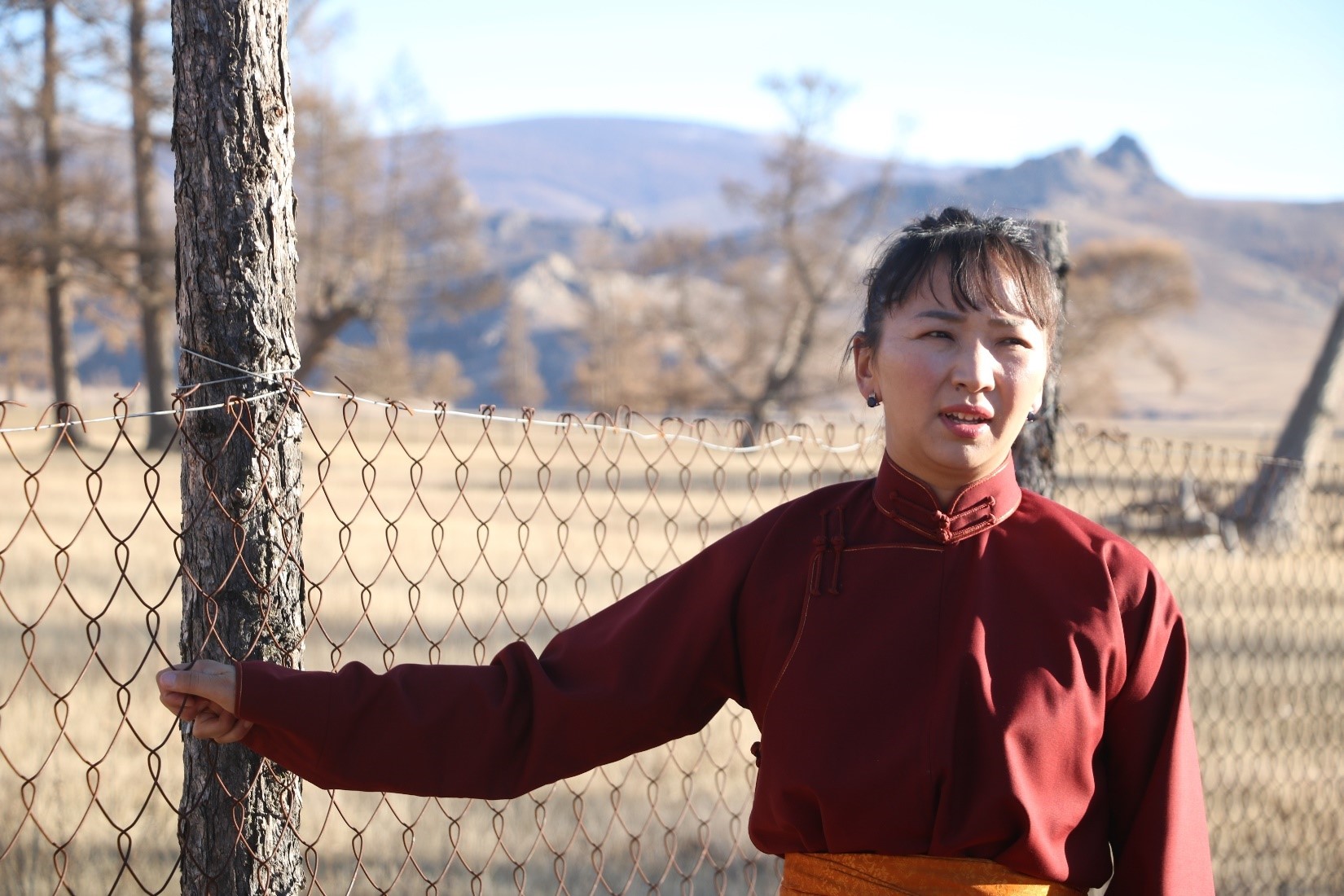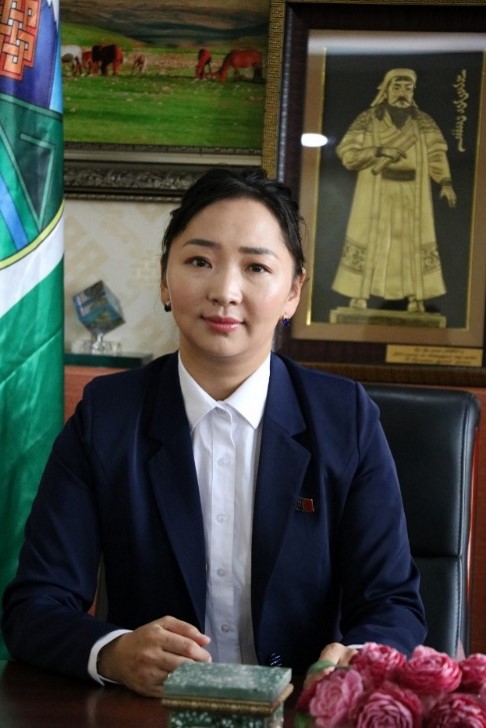
The Ikh-Uul region, a sub-province of Zavkhan in Mongolia, is located within the Khangai mountain range. This area includes the Tarvagatai Mountains National Park, known for its forest-steppe ecosystem and extreme continental, semi-arid climate. The forest reserve, dominated by larch and Siberian pine trees, is home to rare wildlife and plays a critical role in preserving permafrost, essential for regional hydrology. The local community relies on the forest for firewood, timber, pine nuts, wild berries, and edible mushrooms, all vital to their livelihoods.
.jpg)
Photo: Biodiversity in Mongolia
Ms. Odontuya Ononpuntsag, the governor of the Ikh-Uul region, leads efforts to protect this valuable environment. With a background in social sciences and management, Ms. Odontuya earned her community the prestigious title of "Best Administrative Unit" in Mongolia in 2024, establishing herself as a respected and visionary leader.

Ms.Odontuya Ononpuntsag, the Governor Ikh-Uul soum (region)
Local budget for natural resource management
To ensure the effective protection and sustainable management of this ecosystem, an adequate budget and financing are essential to carry out the necessary work. Fortunately, Mongolia has a law on Natural Resource Use Fees, which local administrations are empowered to utilize.
Ikh-Uul soum's primary natural resource is its forest reserve. The soum, with support from UNDP's ENSURE project, funded by the Global Environment Facility, developed a sustainable forest management plan for 2021-2028. This plan includes sustainable management actions, business and finance strategies, and outlines state and local budget-funded administration, coordination, and monitoring activities.
Forest resource use fees are collected as tax revenue for the soum's budget, with local governments reallocating these funds for conservation and restoration to maintain ecosystem integrity. The local governor is responsible for budget proposals, their approval by the local parliament, and overseeing budget execution.
Photo: UNDP Mongolia, the view of Tarvagatai mountainous area
Operating in Mongolia since 2019, the UNDP Biodiversity Finance Initiative (BIOFIN), funded by the German government, plays a critical role in enforcing Mongolia's Law on Natural Resource Use Fees, an important mechanism that allows local administrations to collect taxes from the use of natural resources and invest them in environmental protection.
BIOFIN’s efforts included conducting a gap analysis of the existing legal framework, which led to the government adopting a supplementary act to the Law on Natural Resource Use in 2022. Since then, BIOFIN has focused on raising awareness nationwide, organizing consultation meetings, and conducting training workshops to improve the effectiveness and impact of local budgets on biodiversity. The Ikh-Uul region was one of the first to benefit from these activities.
“BIOFIN is improving the methodology of local budget planning. Result-oriented implementation with clearly defined activities can increase local budget efficiency and contribute to national development targets. It's crucial to prioritize local administration problems and clarify responsible personnel. As the financial gap begins to close, new solutions in environmental protection will emerge” says Odontuya.
Photo: The governor, Ms.Odontuya Ononpuntsa, and the Head of the local Parliament
In 2021, a good yield of pine nuts brought the region around $70,000 in tax revenue. Over 70 percent of this revenue was reinvested in reforestation, pest control, forest thinning, and greening the settlement area to combat the severe outbreaks of forest pests that have plagued the region.
The impressive effort was well appreciated by many among them is Ms. Uranchimeg Tserendorj, Director General of the Department of Natural Resource Policy and Planning at the Ministry of Environment and Climate Change.
She says, “Forest resource use fees are collected into local budgets to ensure ecosystem integration and restore natural resources. Since the fiscal decentralization reforms through the 2011 Integrated Budget Law, local government expenditure responsibilities have significantly increased. Zavkhan Province, known for its forest reserves, is a key focus area. The Ministry highly appreciates Ikh-Uul soum for its exemplary fulfillment of these duties.”
Photo: Pest control measure at the hotspot
Within the reforestation initiative, three polygons totaling 12 hectares were selected to restore the riparian forest, with over ten thousand saplings planted beneath the old trees.
Photo: Degraded forest due to insect outbreak and its regeneration
The community's efforts have been praised by leading politicians in the country, including Uranchimeg Tserendorj, Director General of the Department of Natural Resources Policy and Planning in the Ministry of Environment and Climate Change, who highlighted the Ikh-Uul region as a role model for other regions.
Ensuring accountability and transparency
Ms. Odontuya’s approach to natural resource management goes beyond the immediate challenges of forest conservation. She has also emphasized the importance of transparency and accountability in budget management to ensure that funds generated from the use of natural resources are used for environmental activities.
“Previously, natural resource use fees were allocated to activities unrelated to the environment. However, expenditures on environmental activities have been increasing. While the public treasury and local government audits monitor the efficiency of public spending, the community plays a crucial role in ensuring budget transparency, and they are well aware of this responsibility” says Ms. Odontuya.
Since 2022, the soum administration has focused more on the accountability and responsibilities of forest professional organizations. Despite a notable shortage of human resources, with only three staff members serving 1,700 households, environmental officers have actively planned the revenue and expenditures from natural resource use fees. The local environmental unit now has its budget to address emerging environmental issues.
Photo: One of the common defoliators outbreaking in forest reserves of Mongolia
Learning from the past, planning for the future
One of the key lessons learned from Ikh-Uul’s conservation efforts is the importance of using native species in reforestation projects. In 2021, despite significant efforts to green the settlement area, only 62 percent of non-native seedlings had survived after two years. This experience has shown how important local knowledge and the use of native species are for the success of reforestation initiatives.
Looking to the future, Ms. Odontuya plans to continue the reforestation efforts, focusing on areas with nutrient-rich soil and better moisture content to improve the chances of success. Her visionary leadership demonstrates that committed local governance and strategic financial planning can have an impact on environmental protection and sustainable resource management.
Photo: Aged riparian forest that needs restoration measures
Advocating for gender equality in biodiversity conservation
The story of Ms. Odontuya’s work in the Ikh-Uul region is also a testament to the crucial role of women in biodiversity conservation. Women like Ms. Odontuya are proving that when given the opportunity to take a leadership role, they can make a significant difference in environmental protection.
Photo: Landscape and livelihood in Mongolia
A beacon of hope for the future
At a time when the world is grappling with the twin crises of climate change and biodiversity loss, the combined efforts of Ms. Odontuya and BIOFIN in the Ikh-Uul region are a powerful example of how local action, driven by committed individuals and supported by a sound financial framework, can have a lasting impact on the environment and the people who depend on it. Their work is a beacon of hope, showing that with the right leadership and financial tools, even the most vulnerable ecosystems can be restored and protected for future generations.
About biodiversity and gender equality
In December 2022, at COP 15 of the Convention on Biological Diversity (CBD), the Parties agreed to promote the gender-responsive implementation of the Kunming and Montreal Global Biodiversity Framework and adopted a Gender Action Plan for 2023-2030. The Framework emphasized that successful implementation depends on gender equality the empowerment of women and girls and the reduction of inequalities. UNDP's commitment to gender equality is integral to all efforts to expand people’s choices to realize a just and sustainable world and achieve the vision of the 2030 Agenda for Sustainable Development. It is important to recognize the unique role of women in the field of biodiversity when it comes to policy decisions related to the conservation, sustainable use, and management of nature. However, women often do not have the decision-making power to influence the use of biodiversity.
Written by: Tserennyam Lundaa, BIOFIN coordinator in Mongolia, Mr.Erdenesukh Otgonbayar, Communications Analyst, UNDP Mongolia and Ms.Uyanga Narantuya, Gender Analyst, UNDP Mongolia, and Özlem Culhaci, Gender Focal Point at BIOFIN Global.
Categories
Archives
- février 2026 (3)
- janvier 2026 (3)
- décembre 2025 (2)
- novembre 2025 (5)
- octobre 2025 (5)
- septembre 2025 (2)
- août 2025 (10)
- juillet 2025 (9)
- juin 2025 (5)
- mai 2025 (8)